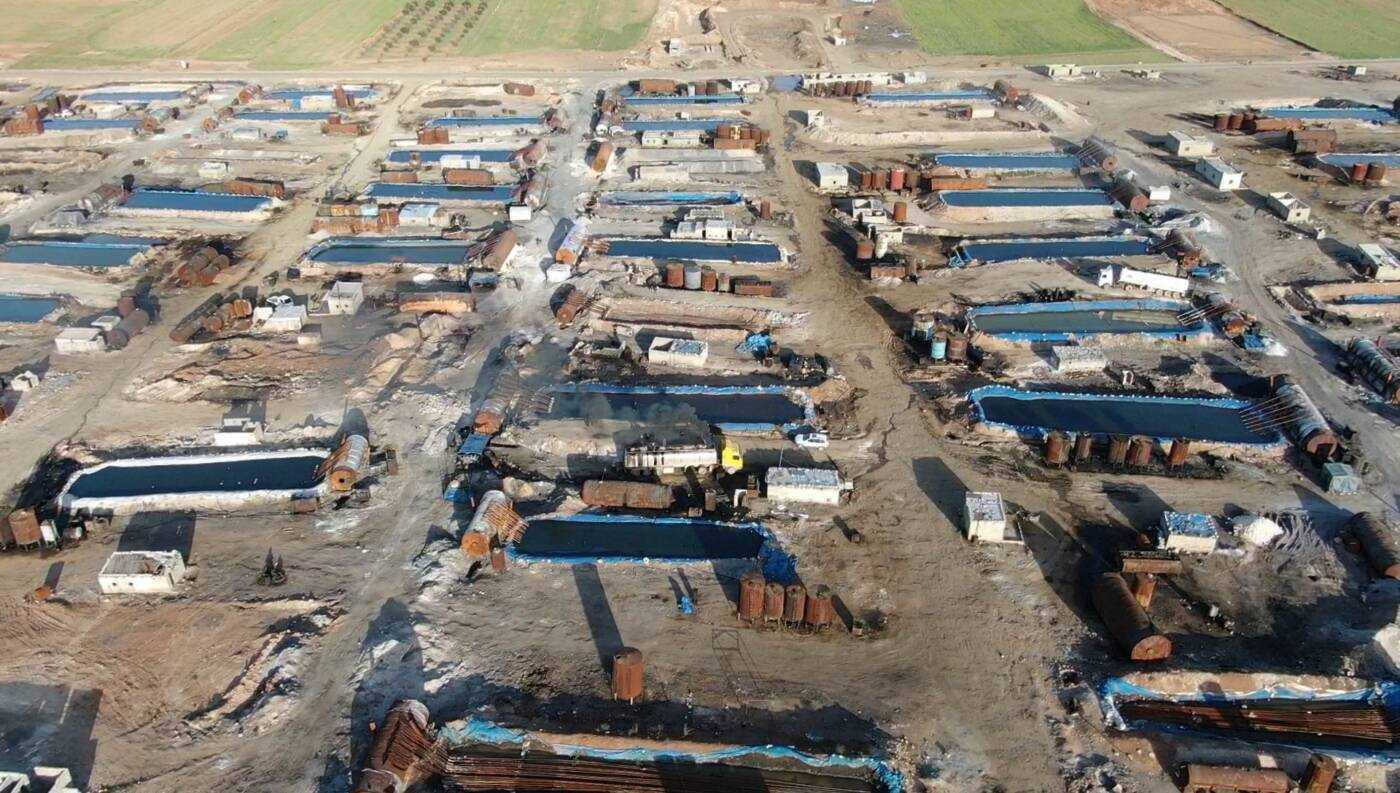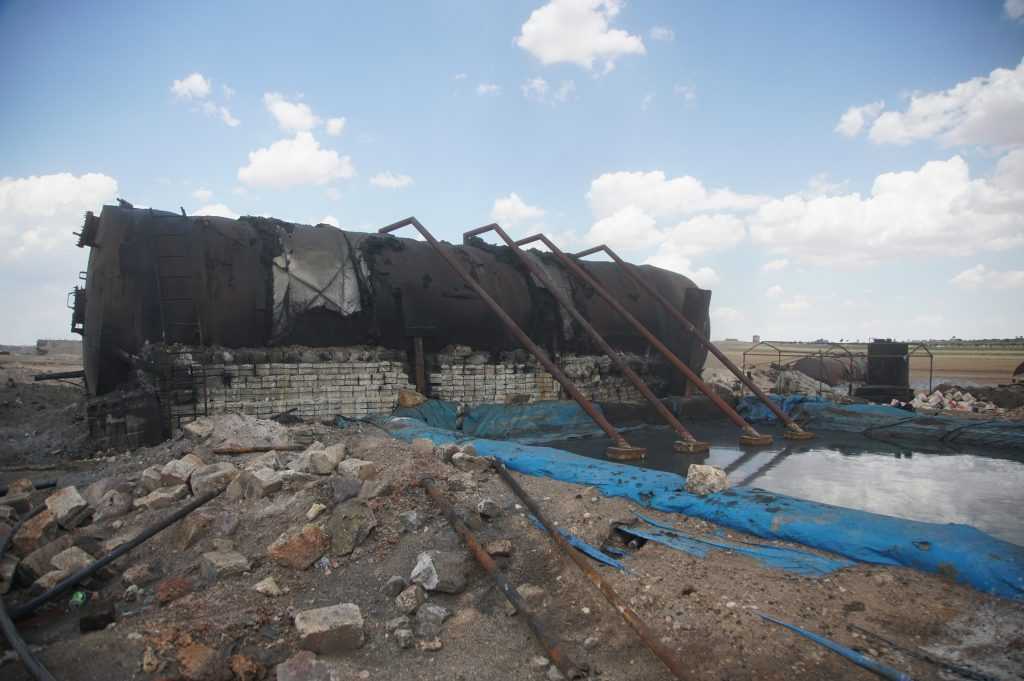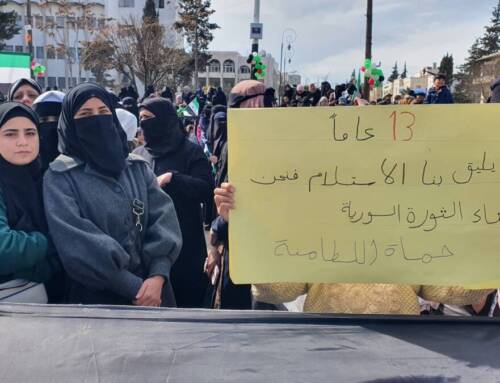‘A ticking time bomb’: Hellish work at northwestern Syria’s makeshift oil refineries
In northwestern Syria, hundreds of makeshift refineries have mushroomed in the past five years, employing thousands of people. With no regulation, their impact on health, life and the environment is catastrophic.
10 June 2022
PARIS, AL-BAB — His clothes blackened by soot, his skin scarred by burns, Abdel Rahman Saeed bears the marks of five years of work in Syria’s makeshift oil industry. Five years spent fueling fires, breathing toxic fumes, standing for hours on end in billowing smoke and scorching heat. Five years of dangerous labor he describes as “a ticking time bomb.”
Saeed, a father of two displaced from the village of al-Safira, southeast of Aleppo city, works bare-handed despite the danger. “You work with fire, next to fire which is under the furnaces where the oil heats,” Saeed told Syria Direct, pointing to an oil burner near the village of Tarhin, in the northern countryside of Aleppo.
Born of the war, makeshift oil refineries have become an integral part of northwestern Syria’s wartime economy. As airstrikes against the Islamic State (IS) in 2015 and 2016 wiped out most of the formal refineries near northeastern Syria’s oil fields, shortages of fuel across the country grew increasingly severe. Makeshift refineries filled the gap, and now provide an essential source of income for thousands of workers—including women and many children—and much of the fuel used by the region’s four million inhabitants for heating and cooking.
In 2015, the city of al-Bab – strategically positioned along the M4 highway that crosses northern Syria from east to west – became the point through which crude oil flowed in from the oil-rich northeastern region, then held by IS, to opposition-held areas of the northwest. By 2018, thousands of refineries had mushroomed there, drawing on makeshift techniques developed in the northeast to transform crude into mazot, a low-quality type of diesel. In 2020, an open-source investigation by Bellingcat estimated that 1,500 to 5,000 such refineries had at some point operated across northwestern Syria.

An aerial view of makeshift burners in Tarhin. Refineries are easily recognizable from the sky by the water ditches next to each burner that cool down the mazot once extracted, 22/03/2022 (Saad Alwan/Violet Organization/Syria Direct)
Many refineries have been forced out of service in recent years by Russian and regime airstrikes, but dozens are still concentrated in Tarhin, on the outskirts of al-Bab, where a quarter of the refineries—around 100 burners—are still active and employ around 1,000 workers, according to a member of the local council in nearby Qabasin village, who requested to remain anonymous for security reasons.
The refineries are an indispensable pillar of northwestern Syria’s economy, but also a major humanitarian and environmental hazard. Work in them is hellish: workers endure constant exposure to toxic gases, punctuated by frequent fires and occasional explosions and bombings. The burners are also major sources of pollution which, if left untreated, will continue to poison local communities for decades to come.
Rubbing shoulders with death
In the first five months of 2022, the Syrian Civil Defense (also known as the White Helmets) put out more than 550 fires across Syria’s northwest. Around 10 percent broke out at makeshift refineries and fuel stations, including 35 around Tarhin. The blazes injured two workers, one of whom was a child, White Helmets first responder Hassan Muhammad told Syria Direct.
Such accidents are unfortunately all too common. Mazot is extracted from crude oil using various types of makeshift equipment, but all follow the same general principles. First, the crude is heated inside a closed burner, or furnace. As the temperature rises, some of the gases contained in the oil evaporate into a pipe that runs through a ditch filled with water. This cools down the gases, which condense, and mazot is collected at the end of the pipe.

Crude oil is heated in a large metal tank, and mazot evaporates into several pipes (center) before cooling down as the gases cross a water-filled ditch, 12/05/2022 (Saad Alwan/ Violet Organization/Syria Direct)
This makeshift method not only exposes workers to frequent accidents, but also makes the end product “very dangerous”, Muhammad added. “Mazot extracted in makeshift refineries contains a large proportion of gas,” which leads to explosions and fires in heaters and engines. Still, many families buy it because it costs half the price of imported diesel: 2,150 Syrian pounds per liter ($0.55 USD according to the May exchange rate of SYP 3,945 to the dollar), compared to SYP 3,350 ($0.90) for imported diesel.
“Sometimes there is no air, so we leave the area around the furnaces. We go out to breathe some oxygen, or else we suffocate.”
The White Helmets run awareness-raising programs training refinery workers on the use of fire extinguishers, different types of fires and their causes, and how to evacuate sites in case of an accident. While such awareness campaigns can limit deadly accidents, they cannot protect workers from the dangers inherent to their job. Nor can they guard against frequent regime and Russian strikes. In 2021, three attacks on refineries around Tarhin killed three civilians and injured eight, and also sparked huge fires, according to the White Helmets.
Suffocating work
Heating crude oil generates toxic fumes linked to the emergence of chronic respiratory diseases, liver and kidney damage, and even cancer (see Part 2 and 3 of this series). The gases can also cause heavy damage to the eye’s cornea, leading some workers to go blind.
[irp posts=”44774″ name=”‘Worse than being on the frontline’: A day at Syria’s makeshift oil refineries (Photos)”]“Sometimes there is no air, so we leave the area around the furnaces. We go out to breathe some oxygen, or else we suffocate,” Ahmad al-Abdallah, the owner of a makeshift refinery near Tarhin, told Syria Direct. “Someone who is not used to it and comes here cannot stand in the refinery for even 15 minutes when it is operating.”
Despite the dangers they face, workers are not given any protective equipment such as boots, gloves, masks or protective clothing. Some say they have “adapted” to these conditions. “There are people who give up and leave the refineries, they say they can no longer work. Others get used to the job, it becomes very natural,” al-Abdallah said.
The effects of toxic gases reach far beyond the refineries themselves. Around Tarhin, dozens of young children have reportedly been hospitalized for breathing problems. “Hospitalization rates are higher in areas surrounding the burners and are due to the higher prevalence of respiratory diseases in children—asthma attacks, bronchiolitis—in addition to skin diseases and severe skin rashes that resist normal treatment,” a pediatrician working in al-Bab Hospital, who asked to remain anonymous for security reasons, told Syria Direct.
“Most of the cases treated at the hospital in al-Bab in 2019 were caused by the burners and by the use of charcoal produced at the makeshift refineries for heating,” the pediatrician added.
A temporary lifeline
Some workers are unaware of the long-term health risks they face at the furnaces. “Of course, this fuel releases toxic substances, really toxic, that don’t smell very good, but it does not cause diseases,” Jumaa Ali Hussein, a worker at one of the refineries, told Syria Direct. For Hussein, exposure is better than starvation. “Smoke and smell, I don’t care. Work is the most important thing.”
“We chose this profession out of poverty”
Like Hussein, many workers see the refineries as a temporary lifeline–albeit one that kills slowly. “I started to work in the furnaces as soon as I was displaced, because there is nowhere else to work,” al-Abdallah said. “We chose this profession out of poverty,” Mamduh Issa, one of the workers, agreed.
Poverty traps entire families in this industry. Women work near the burners, collecting by-products of the refining process that can be sold as heating sources. “Even dirt contaminated with fuel, they take it with them to sell it,” al-Abdallah said. Child labor is also widespread, and particularly dangerous. Because of their small size, children squeeze inside the furnaces to scrape burnt leftovers from the walls, breathing in the toxic particles.
[irp posts=”44754″ name=”How Syria’s makeshift refineries poison people—and the land that sustains them (Photos)”]Wages in the sector vary. Supervisors of the refining process, known as “cooks,” earn $30-40 each time the burner operates. The salary can be good in peak times, according to Saeed, but in recent months the burners rarely operated more than three times a month, leaving him with at most $120. Those who clean the furnaces, scraping out coal and refining residue, earn $5 per day at most, according to the workers who spoke to Syria Direct.
Still, these meager wages are higher than other jobs: teachers in northwestern Syria can expect to earn 1,000 Turkish liras ($60) per month at most, while restaurant and shop employees earn $2-3 a day.
A way forward?
Workers and local communities are left to bear the consequences of the industry alone. Environmental governance and workplace regulations are nonexistent, and hardly priorities in a wartime context.
“There is no law governing the refineries sector, there is no license for owners,” the Qabasin local council member added. “The local council has no authority over this.”
“The local council and the government here are not involved at all in this,” al-Abdallah confirmed. “The owner of the refinery is the first and last to work, he is the one to suffer all costs.” Cleaning up the area after a refinery goes out of service is not a legal requirement and, even if it was, is financially out of reach for refinery owners.
In the meantime, local humanitarian organizations are trying to reduce child labor in refineries, increase workers’ awareness of the health risks they face and bring children back to school. “If it is not possible to get rid of the burners, [responsible authorities] must regulate them, and permanently prevent child work there,” Khaled Qabash, the director of the Food Security and Livelihoods Program at Violet Organization, told Syria Direct.
In the absence of alternative income sources and with 90 percent of Syrians living below the poverty line, makeshift refineries are a lifeline—not only for workers, but for millions of Syrians struggling to survive the winter months. But it comes with a hidden price, one settled in human suffering.
**
This report was produced with the financial support of the European Union, but does not necessarily reflect the views of the European Union. Its contents are the sole responsibility of Syria Direct and Violet Organization.







